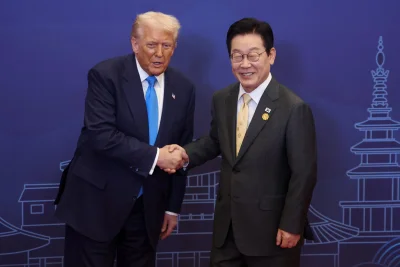Door opened for Seoul’s pursuit of uranium enrichment, spent fuel reprocessing

The U.S.-South Korea trade deal fact sheet released Friday opens the door for Seoul to secure rights to enrich uranium and reprocess spent nuclear fuel. The agreement, struck during the meeting between U.S. President Donald Trump (L) and South Korean President Lee Jae Myung at the APEC summit in Gyeongju in October, approves South Korea’s quest to build nuclear submarines. Photo by Yonhap
South Korea took a major step forward Friday in its long-running quest to secure rights to enrich uranium and reprocess spent nuclear fuel for peaceful purposes, with the United States affirming its support in the countries’ joint summit document.
The joint fact sheet, released earlier in the day, outlines the agreements reached in the two summits between President Lee Jae Myung and U.S. President Donald Trump. It covers the allies’ commitments on a range of key trade and security issues.
“Consistent with the bilateral 123 agreement and subject to U.S. legal requirements, the United States supports the process that will lead to the ROK’s civil uranium enrichment and spent fuel reprocessing for peaceful uses,” the document showed. ROK stands for South Korea’s official name, the Republic of Korea.
Under the 123 agreement on peaceful nuclear energy cooperation, South Korea has very limited authority to reprocess spent nuclear fuel or enrich uranium for civilian purposes, as such activities require U.S. consent through bilateral consultations under the relevant treaties, laws and regulations governing both countries.
The agreement only allows South Korea to enrich uranium up to less than 20 percent based on U.S. consent, with U.S. concerns over nuclear proliferation known as the primary reason.
The nuclear energy pact, forged in 1974, was revised once in 2015 for a 20-year term, to accommodate Seoul’s request for the rights to reprocess spent fuel and enrich uranium, but it has been seen as effectively barring Seoul from producing its own civilian nuclear fuel.
South Korea, a global nuclear energy powerhouse, has long sought to expand its rights as a way to address growing nuclear waste stockpiles.
The country currently operates 26 commercial nuclear reactors. The storage for spent fuel rods from the reactors is expected to reach full capacity around 2030.
Its push to revise the agreement also comes as South Korea seeks to secure fuel supplies for its bid to build nuclear-powered submarines, a project for which it has obtained U.S. approval, as confirmed in their joint fact sheet.
Announcing the result of the summit Friday, Lee called U.S. support for Seoul’s uranium enrichment and spent fuel reprocessing a “significant advancement.”
“The door is now wide open for a South Korea-U.S. alliance renaissance, in which both nations can achieve a true win-win outcome,” he said.
In separate press material, the foreign ministry described the agreement on enrichment and reprocessing as “a strategic upgrade” of bilateral nuclear energy cooperation.
“We have publicly secured U.S. backing for (uranium) enrichment and spent fuel reprocessing for the first time,” the ministry said.
Having secured such support from its ally, South Korea faces a long and complex road ahead to advance these efforts, as implementing the agreement will require a lengthy and challenging negotiating process that could take years or more.
Seoul and Washington would need to decide whether the U.S. will allow uranium enrichment and spent fuel reprocessing within the current 123 agreement framework, or by revising the pact. Either way, tough negotiations over the terms are expected.
“It will require extensive discussions,” National Security Adviser Wi Sung-lac said following the joint fact sheet announcement. “How much adjustment is needed will depend on the results of these consultations,”
The prevailing view is that South Korea has looked at Japan’s 1988 agreement of the same kind with the U.S. as a case model. The U.S. has given Japan preapproved and long-term permission, known as “advance consent,” for the enrichment and reprocessing. It allows Japan to produce highly enriched uranium over 20 percent if the two parties agree.
First Vice Foreign Minister Park Yoon-joo signaled that the government is considering a revision.
“We are in talks with the U.S. with a revision in mind,” he told lawmakers during a parliamentary session.
South Korea and the U.S. have established a high-level bilateral commission under the 123 agreement. Any follow-up talks could start by resuming this platform.
Going forward, how Seoul will work with Washington to dispel nuclear proliferation concerns from within the U.S. government remains another major challenge.
It took more than two weeks after the Lee-Trump summit for the joint fact sheet to be released, apparently due to extended coordination among the relevant U.S. government agencies.
Wi said Friday that the delay had much to do with the enrichment and reprocessing issues.
“The bulk of the final discussions (within the U.S.) had focused on uranium enrichment and reprocessing,” he told reporters at the briefing.
“In any case, we believe the agreement will need some form of adjustment.”